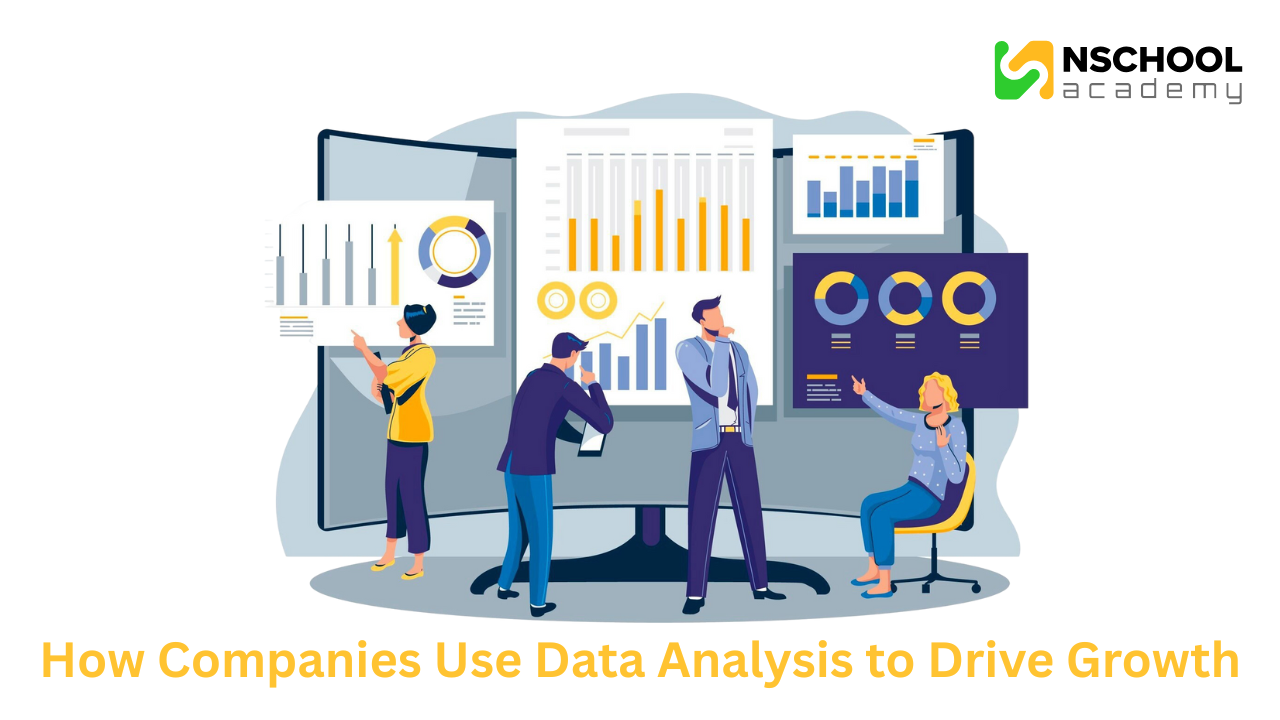How Companies Use Data Analysis to Drive Growth
- June 2, 2025
- nschool
- 0

How Companies Use Data Analysis to Drive Growth
In today’s fast-moving world, companies rely more and more on data analysis to make smart decisions and grow steadily. By looking at real examples, we can see how successful businesses use data to stay ahead, improve how they work, and get real results.
1. Amazon: Personalization Data Analysis to Drive Growth
Amazon uses data analysis to study customer behavior, such as what they search for, buy, and review. This information helps Amazon recommend products that match each person’s interests. By making shopping simple and customized to each person, Amazon motivates customers to purchase more.
This leads to higher sales and steady business growth. Using data analysis in this way allows Amazon to keep improving its services and stay ahead in the market.
2. Netflix: Using Viewer Data to Boost Engagement and Retention
Netflix uses data analysis to learn what shows and movies people like to watch. They look at how long users watch, what they rate, and what they search for. This helps Netflix suggest shows and movies that each person will enjoy. Because the recommendations are good, people stay longer on the platform and do not cancel their subscriptions. This keeps more viewers watching and helps Netflix grow steadily. Using data analysis this way is very important for Netflix to stay successful and strong in the busy streaming market.
3. Walmart: Supply Chain Efficiency Through Smart Data Use
Walmart uses data analysis to predict what products customers will need and when. They look at sales patterns along with real-time information like the weather and local events. This helps Walmart keep the right amount of stock in their stores and avoid having too much extra inventory. By doing this, Walmart saves money and makes their operations more efficient. These smart decisions help Walmart serve customers better and support steady growth across all their stores.
4. Starbucks: Fueling Loyalty Programs with Insights
Starbucks uses detailed understand what customers like and how they shop. They look at customer purchases and preferences to create special rewards and offers just for them. These personalized deals encourage customers to come back more often and buy more. This helps Starbucks build strong relationships with customers, making them loyal to the brand. As a result, Starbucks sees more sales and steady growth over time. Using data analysis in this way helps the company keep customers happy and grow its business.
5. Uber: Real-Time Data Analytics for Strategic Decision-Making
Uber uses real-time data analysis to set prices and send drivers to riders quickly. They study traffic, how many people need rides, and where drivers are available. This helps Uber match drivers with riders in the best way possible. Because of this, riders get faster service and drivers stay busy. This makes customers happier and helps Uber expand its business in fast-moving and competitive markets. Using smart data analysis like this supports Uber’s ongoing growth and success.
6. Coca-Cola: Tracking Market Trends to Guide Strategy
Coca-Cola uses data analysis to keep track of sales and listen to what customers say about their products in different areas. This information helps the company create new drinks that people will like and plan better advertising. By understanding what customers want, Coca-Cola can make smarter decisions that keep it popular and competitive. Using these insights helps the company stay connected to customers and supports strong growth in the busy beverage market.
7. American Express: Minimizing Fraud, Maximizing Trust
American Express uses advanced data analysis to watch how customers spend their money and spot any unusual or suspicious activity right away. This helps the company stop fraud before it happens, keeping customers safe and confident. When customers feel protected, they trust American Express more. This trust is very important for the company’s long-term success and growth in the financial industry. Using data analysis this way helps American Express stay secure and grow its business over time.
8. Target: Predictive Analytics in Retail Growth
Target studies what customers buy to understand their needs and important life moments, such as having a baby. This type of predictive data analysis helps Target send personalized offers that match what customers want at the right time. By giving helpful and relevant promotions, Target keeps customers interested and encourages them to shop more. This approach increases sales and supports steady growth for the company. Using like this helps Target connect better with customers and grow its business.
9. Airbnb: Enhancing User Experience Through Data
Airbnb uses data analysis to make its search system better and show personalized suggestions to each user. This helps people find the perfect places to stay more easily and quickly. By improving how users experience the platform, Airbnb encourages more bookings and keeps customers coming back. These improvements build strong loyalty and help Airbnb stay competitive. Using data analysis in this way supports the company’s continued growth in the travel market.
10. IBM Watson Health: Empowering Healthcare with Data
IBM’s Watson Health platform uses to study medical records, research articles, and clinical reports. By understanding large amounts of health information quickly, it helps doctors and nurses make better and faster decisions. This leads to improved patient care and can even help find new treatments. With the support of this technology, healthcare professionals can work more efficiently and accurately. Using smart tools like Watson Health also helps bring new ideas and solutions into the medical field, supporting the growth of innovation in healthcare.
Conclusion
In many industries, like retail and healthcare, data analysis is not just a trend—it’s an important tool for success. Companies that use data in their daily decisions can move faster, keep customers happy, and find new ways to improve. The examples above show how real businesses are using data to not only stay in the game but also to grow and succeed. By making smart choices through data, these companies are reaching new levels of growth and staying strong in a changing world.

